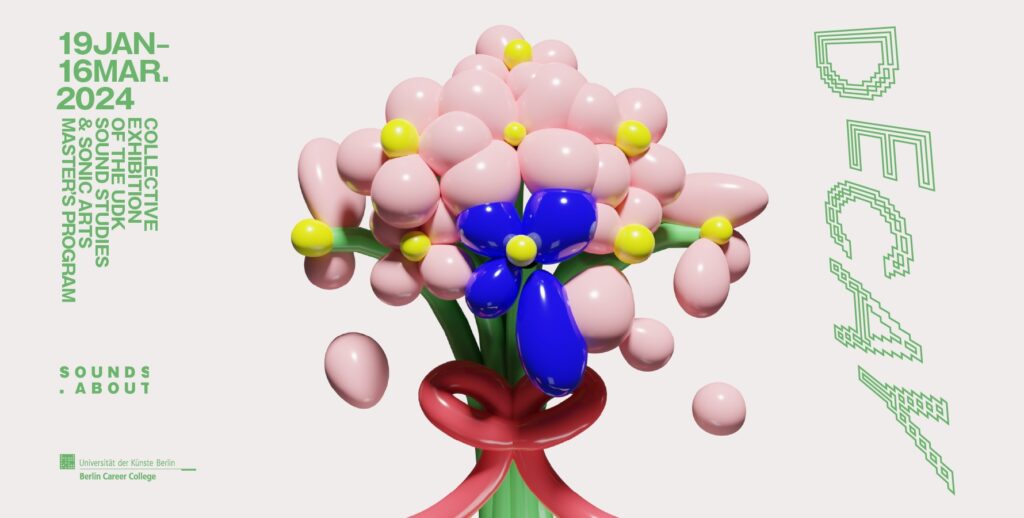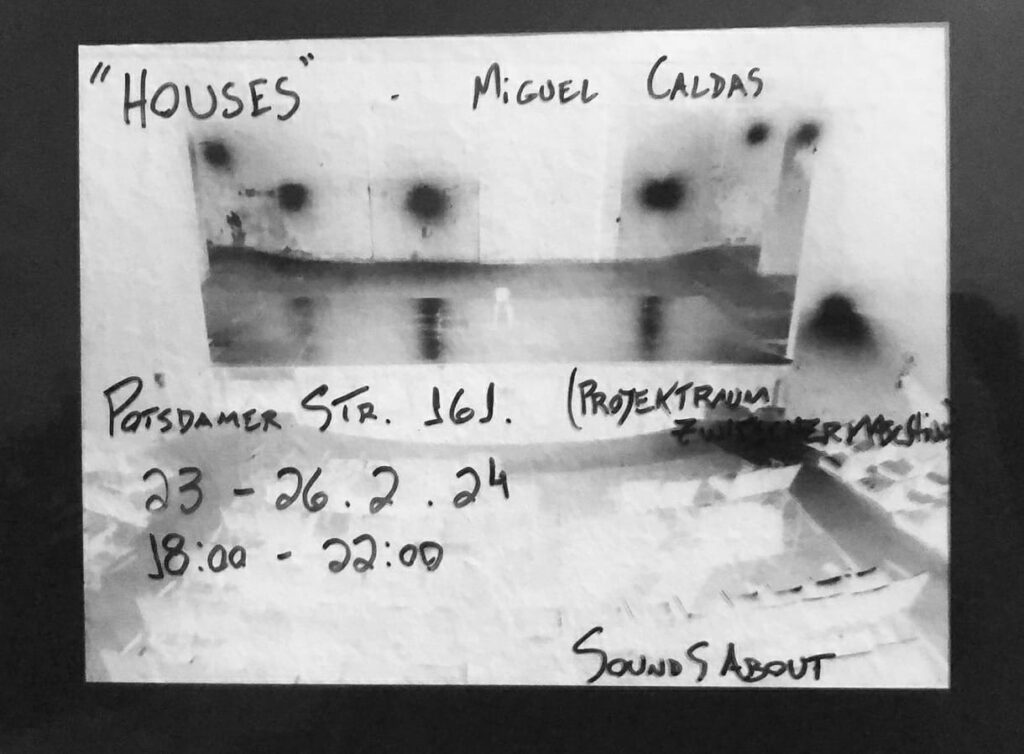
Miguel Caldas
HOUSES

23.02. – 26.02.
Eröffnung: Fr 23.02.2024 • 18 – 22 Uhr
Ausstellung: Sa/So/Mo 24.02./25.02./26.02. • 18 – 22 Uhr
deutsch weiter unten
“Houses are really bodies. We connect ourselves with walls, roofs, and objects just as we hang on to our livers, skeletons, flesh and blood stream”
Leonora Carrington – The Hearing Trumpet
My entire life I dwelled in Theatres, I linger in them, sleep and eat in them, loiter in them, fill them with sound and work myself to exhaustion in them. I am now – until recently – recording the sound of Theatres when they are not occupied by performance, setup or rehearsal; I record them when their performance halls are deserted and their buildings are as uninhabited as possible. I started collecting them expecting the Theatres to come forward and not be shy in sounding their own voices – which I’m not sure it even exists.
This installation is the first showing of an action that will probably never end. It’s also an invitation to listen to the Theatre venues that I have collected so far, and an attempt to share them collectively to put them forward as performers. When these performance houses are not occupied, are they in a resting state just existing dormant, idle and silent? Is their purpose to just resonate whatever plays inside them in the moment or are they continuously echoing their insides, their outsides, their pasts and presents?
Miguel Caldas (São Paulo, 1986) is a sound designer, musician and composer. Works mainly in Theatre and Dance as a collaborator who translates staging and dramaturgical concepts intosound and who practices within the indivisibility between composition and technical sound design. Lately has been expanding his practices into sculpture and installation works and studying the M.A. program Sound Studies and Sonic Arts in Berlin.
* SoundsAbout is a collaboration between the Master’s program Sound Studies and Sonic Arts at the University Berlin and the gallery Zwitschermaschine, offering a project space to present and discuss, question and celebrate the work and ideas of our students and their guests for three months every year.
„Häuser sind eigentlich Körper. Wir verbinden uns mit Wänden, Dächern und Gegenständen, so wie wir an unseren Lebern, Skeletten, Fleisch- und Blutströmen hängen“
Leonora Carrington – Die hörende Trompete
Mein ganzes Leben habe ich in Theatern verbracht, ich verweile in ihnen, schlafe und esse in ihnen, lungere in ihnen herum, fülle sie mit Klang und arbeite mich in ihnen zu Tode. Jetzt – bis vor kurzem – nehme ich den Klang von Theatern auf, wenn sie nicht mit Aufführungen, Aufbauten oder Proben belegt sind; ich nehme sie auf, wenn ihre Säle verlassen und ihre Gebäude so unbewohnt wie möglich sind. Ich habe angefangen, sie zu sammeln, in der Erwartung, dass die Theater sich melden und sich nicht scheuen, ihre eigenen Stimmen zu erklingen zu lassen – wobei ich mir nicht sicher bin, ob es sie überhaupt gibt.
Diese Installation ist der erste Teil einer Aktion, die wahrscheinlich nie enden wird. Sie ist auch eine Einladung, den Theaterhäusern zuzuhören, die ich bisher gesammelt habe, und ein Versuch, sie gemeinsam zu nutzen, um sie als Performer zu präsentieren. Wenn diese Aufführungsorte nicht besetzt sind, befinden sie sich dann in einem Ruhezustand, in dem sie einfach nur schlummern, untätig und still sind? Dienen sie nur dazu, das widerzuspiegeln, was sich in ihnen gerade abspielt, oder lassen sie ständig ihr Inneres und Äußeres, ihre Vergangenheit und Gegenwart widerhallen?
Miguel Caldas (São Paulo, 1986) ist Sounddesigner, Musiker und Komponist. Er arbeitet vor allem im Theater- und Tanzbereich als Kollaborateur, der szenische und dramaturgische Konzepte in Klang umsetzt und mit der Untrennbarkeit von Komposition und technischem Sounddesign arbeitet. In letzter Zeit hat er seine Praxis auf Skulpturen und Installationen ausgeweitet und studiert den Masterstudiengang Sound Studies and Sonic Arts in Berlin.
* SoundsAbout ist eine Kooperation zwischen dem Masterstudiengang Sound Studies and Sonic Arts an der Universität Berlin und der Galerie Zwitschermaschine, die jedes Jahr für drei Monate einen Projektraum bietet, in dem die Arbeiten und Ideen der Studierenden und ihrer Gäste präsentiert und diskutiert, hinterfragt und gefeiert werden.